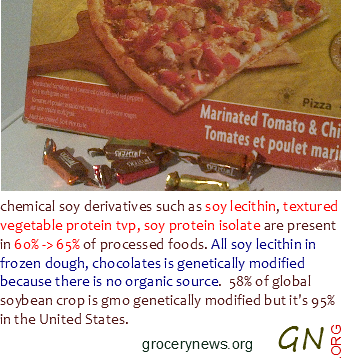Soy Lecithin Say It Ain't So-y ! Roundup Ready GMO, Phytoestrogens
- Details
- Sarah
- Health and Nutrition
- Hits: 6591
If you're an avid reader of ingredient labels then you've probably already come across the soybean oil derivative soy lecithin. Soy lecithin is a derivative of soy - it's chemically made by adding complex compounds such as hexane to by-products of the soy oil process ; other examples are mono-diglycerides and soya.
 At present, soy and its chemical derivatives lecithin, tvp and soy protein isolate are used in 60% to 70% of all processed foods, a surprising statistic given that prior to the late 20th century soybean wasn't even a major industrial crop; By the turn of century it accounted for 22% of all US cropland exceeded only by corn (77.5 million acres in 2009). The main reason lecithin's are so common in processed foods is due to their effectiveness as texturizing agents (nonsticky), emulsifiers (mixing ingredients that normally don't mix), volumizers, it even protects the yeast in frozen pizza crust.
At present, soy and its chemical derivatives lecithin, tvp and soy protein isolate are used in 60% to 70% of all processed foods, a surprising statistic given that prior to the late 20th century soybean wasn't even a major industrial crop; By the turn of century it accounted for 22% of all US cropland exceeded only by corn (77.5 million acres in 2009). The main reason lecithin's are so common in processed foods is due to their effectiveness as texturizing agents (nonsticky), emulsifiers (mixing ingredients that normally don't mix), volumizers, it even protects the yeast in frozen pizza crust.
Soy lecithin's popularity may be owing to its soy element - Because soy is high in fiber, protein, and phytonutrients such as isoflavones which have been shown to reduce cholesterol. Another reason companies are choosing soy lecithin over other lecithins (corn, eggs) is because, in 1995 when the organic standards were being developed by the USDA, soy lecithin was one of only a handful of conventional ingredients that got a free pass (no alternatives + no organic sources of soy lecithin = even genetically modified soy lecithin is permitted in organic foods up to 5%). This means that virtually all lecithin used in organic food is coming from genetically modified crop (90% of US soybean crop is gmo).
Soy is healthy, right ? so what's wrong with Soy Lecithin ??
First off, not all soy is healthy. The long term impact GMO foods have on human health has yet to be determined, so when you consider the fact that 58.6% of the world's soybean crop is bioengineered, the health effects of consuming soy must also be called into question. The stats also change depending on where you live; in the U.S. and Brazil, the percentage of all soybean crop that's been genetically altered exceeds 90%, which is much higher than the global average. In fact at the turn of the millenium, Roundup Ready crop (infected by Monsanto with glyphosate for herbicide resistance) alone accounted for 54% of the soybean crop in the United States. Soy can be healthy ! It's true that fermented soy packs the punch of high fiber + vitamin K + unique phytonutrients without many of the harmful elements (fermentation removed them).
Soy lecithin contains phytoestrogen compounds - daiszein and genistein
Yes these are plant estrogens not human hormones, but what's disturbing is their ability to mimic the female hormone estrogen in animal tissues. Apparently female estrogen receptors aren't as selective as most other hormone receptors and that makes it easier for closely related compounds such as phytoestrogens to link up and ultimately effect gene expression. This can trick the body into thinking it has too much estrogen - the body responds by decreasing the amount of natural estrogen available. According to studies, this makes women more susceptible to certain types of disease.
In conclusion, soy can be healthy if taken from the right sources. Also, there are many studies out there that remain inconclusive giving at least some credence to those who maintain that, in the case of bodybuilders and others who require high protein intake, soy is still a great option.
